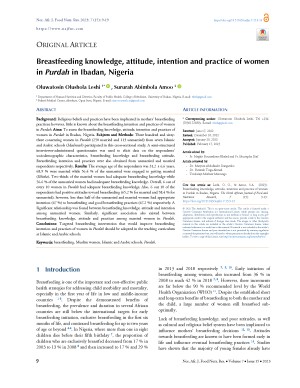Breastfeeding knowledge, attitude, intention and practice of women in Purdah in Ibadan, Nigeria
Abstract
Background: Religious beliefs and practices have been implicated in mothers’ breastfeeding practices; however, little is known about the breastfeeding intention and practices of women in Purdah. Aims: To assess the breastfeeding knowledge, attitude, intention and practices of women in Purdah in Ibadan, Nigeria. Subjects and Methods: Three hundred and sixty-three consenting women in Purdah (250 married and 113 unmarried) from seven Islamic and Arabic schools (Madrasah) participated in this cross-sectional study. A semi-structured interviewer-administered questionnaire was used to elicit data on the respondents’ sociodemographic characteristics, breastfeeding knowledge and breastfeeding attitude. Breastfeeding intention and practices were also obtained from unmarried and married respondents respectively. Results: The average age of the respondents was 31.2 ± 6.6 years, 68.9 % were married while 56.4 % of the unmarried were engaged to getting married (Khitba). Two-thirds of the married women had adequate breastfeeding knowledge while 56.6 % of the unmarried women had inadequate breastfeeding knowledge. Overall, 6 out of every 10 women in Purdah had adequate breastfeeding knowledge. Also, 6 out 10 of the respondents had positive attitudes toward breastfeeding (65.2 % for married and 58.4 % for unmarried), however, less than half of the unmarried and married women had appropriate intention (47 %) to breastfeeding and good breastfeeding practices (47.2 %) respectively. A Significant relationship was found between breastfeeding knowledge, attitude and intention among unmarried women. Similarly, significant association also existed between breastfeeding knowledge, attitude and practices among married women in Purdah. Conclusions: Targeted breastfeeding intervention that would improve breastfeeding intention and practices of women in Purdah should be adopted in the teaching curriculum at Islamic and Arabic schools.
Full text article
Authors
Copyright (c) 2023 Oluwatosin Olushola Leshi, Sururah Abimbola Amoo

This work is licensed under a Creative Commons Attribution 4.0 International License.
-
Attribution — You must give appropriate credit, provide a link to the license, and indicate if changes were made. You may do so in any reasonable manner, but not in any way that suggests the licensor endorses you or your use.
-
No additional restrictions — You may not apply legal terms or technological measures that legally restrict others from doing anything the license permits.





